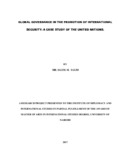| dc.description.abstract | The statement of the problem of this study was to establish the global governance in the promotion of international security with reference to the United Nations. Challenge of global governance for the world to produce order, stability and predictability. The research question and objectives were to examine and analyze the key international security challenges facing the global community, to assess the role of global governance in promoting international security, and to examine the challenges in governance that the UN faces and how they impact on its ability to promote international security. The gap which this study sought to fill were to find solutions to even in the absence of a world government is six fold: the evolution of international organizations to facilitate robust global responses lags behind the emergence of collective action problems; the most pressing problems nuclear weapons, terrorism, pandemics, food, water and fuel scarcity, climate change, agricultural trade are global in scope and require global solutions: problems without passports in search of solutions without passports. This study was anchored on the Liberalism theory which believes the goodness of human being„s nature and also the importance of political institutions to achieve social development and progress. The study Hypothesis Testing went by, the key international security challenges facing the global community are not significant, the key international security challenges facing the global community are significant, there are no significant roles of global governance in promoting international security, there are significant roles of global governance in promoting international security, the challenges in governance that the UN faces have no significant impact on its ability to promote international security and the challenges in governance that the UN faces have a significant impact on its ability to promote international security. Data findings established that today the world is more complex and unpredictable than ever before. Moreover, the findings found out that Such partnerships are, however, far more than merely „institutional patches‟ to overcome technical glitches in how we organize ourselves. They are new forms of institutionalized power and associated patterns of accountability. At times they consolidate existing patterns of control over resources, business strategy and public policy. In other instances, they are designed to and can drive shifts in wealth creation, distributional and political outcomes. Partnerships, both the fact of their emergence, and their specifics in any particular situation, are a manifestation of a contested, and dynamic social contract. The study recommends that The capacity of Global governance to make use of a plethora of data and knowledge from other disciplines makes it the right area to study global, international, national, community and individual perspectives, with the aim of revealing the complexity behind international security insecurity, prevent wars in the international system and create a new global order based on multilateral cooperation, promoted by the need to preserve our common international security. | en_US |



